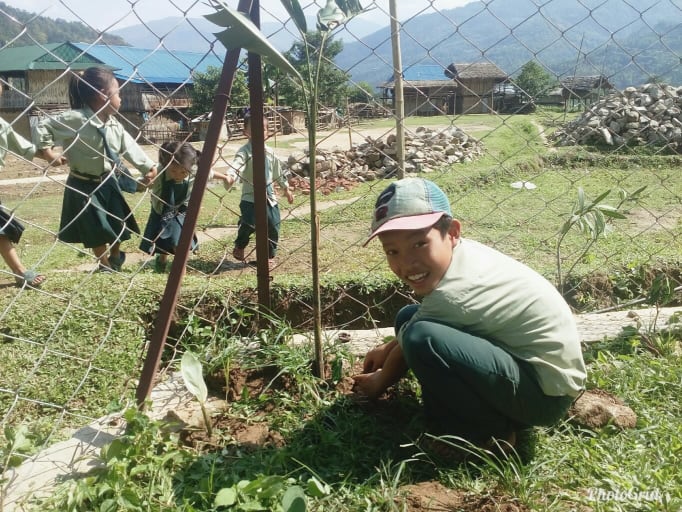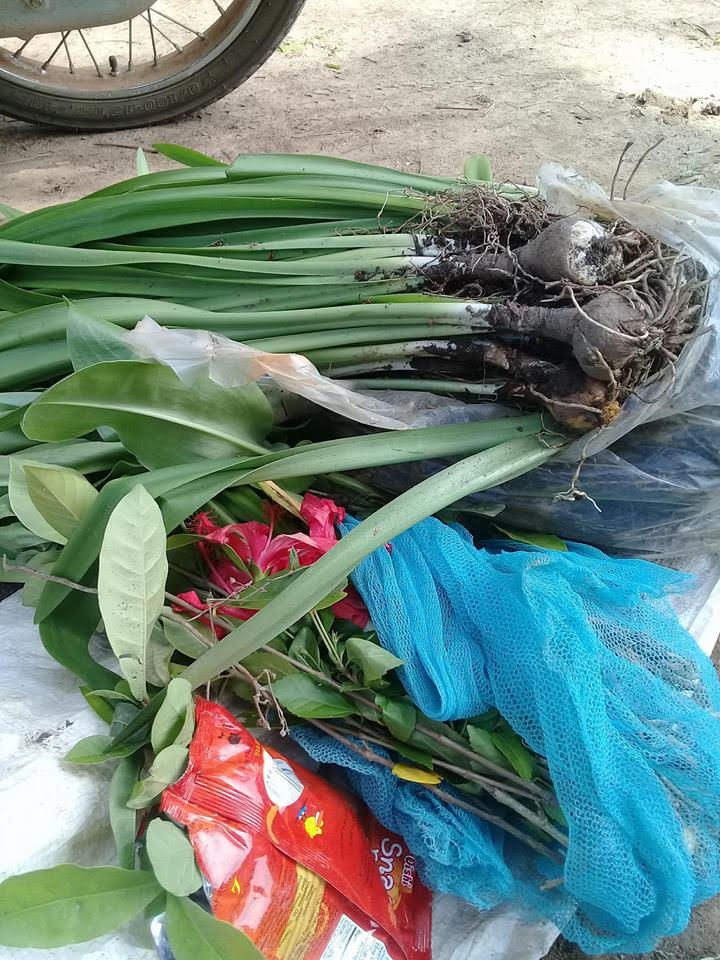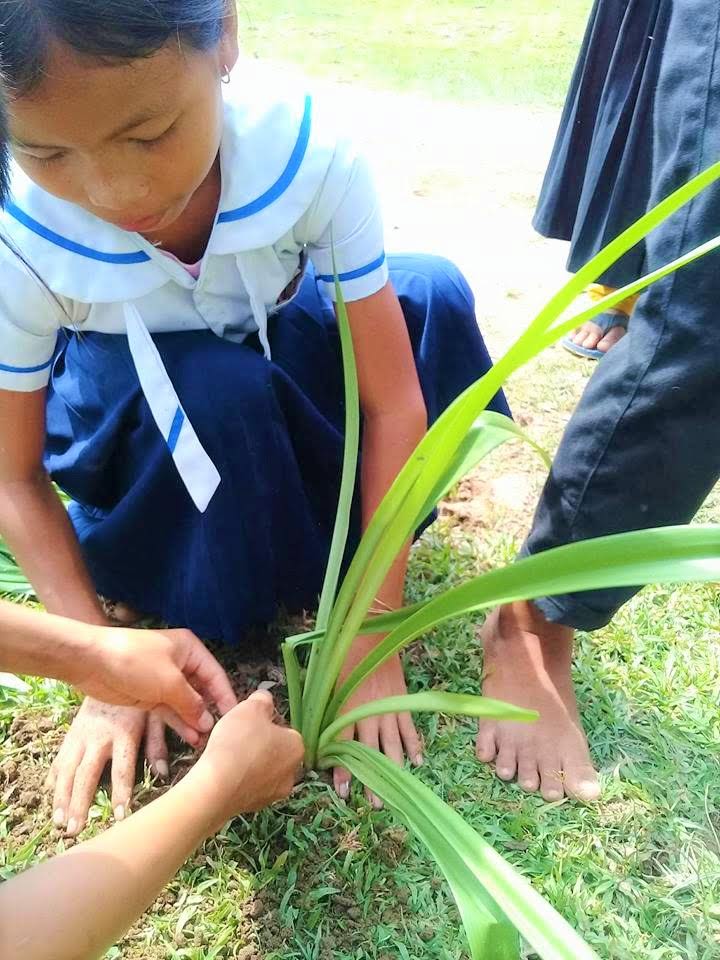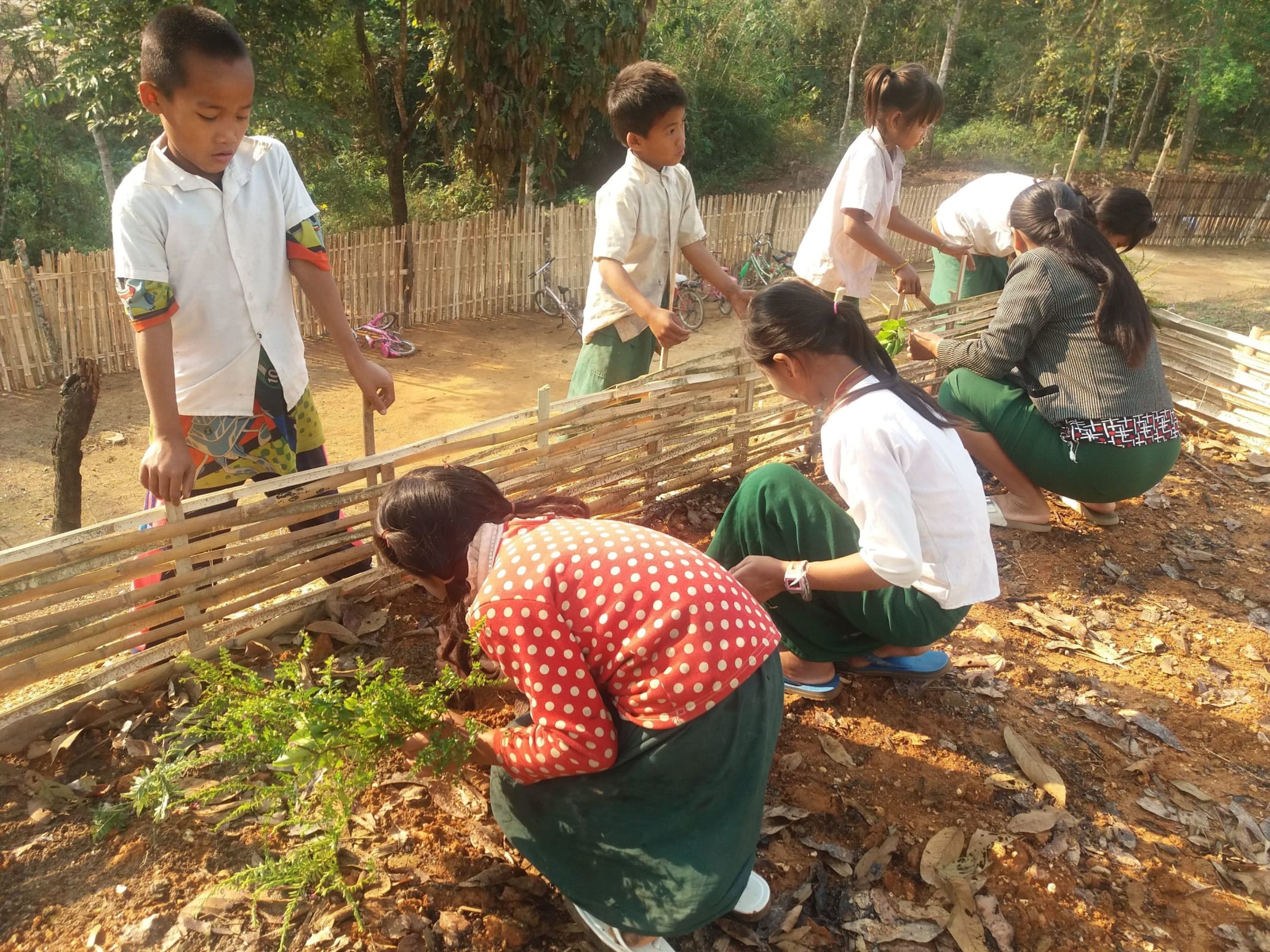Multilingual countries across the globe face difficult decisions about which language to teach in schools. The more languages spoken within a country, the more complex the challenge to provide free education for all. This means indigenous ethnic minority groups often disproportionately miss out on education due to the language factor - there simply isn’t the option to attend school and receive an education in a language they understand.
The communities we work with in South Asia make up some of the most linguistically diverse regions in the world. The remote communities with whom we work in Cambodia, Nepal and Myanmar are mostly made up of ethnic minority groups whose first languages are not the national language. Myanmar alone is home to over 100 indigenous ethnic groups, all of whom have their own dialects.
We believe that education is a right for everyone, and we are working towards achieving Sustainable Development Goal 4 to ensure inclusive and quality education for all. This is why we train teachers from the communities with whom we work, who are able to teach children in a language they understand.
It is estimated that 40% of the world’s population do not have access to education in a language that they speak or understand.
The challenge of providing education in many languages means that even highly multilingual countries often only teach in the “national language.” When indigenous language speakers are taught in a language they do not understand, they understandably struggle. These children are placed at a disadvantage compared to other children who speak the national language as their first language. By employing community teachers in our schools who speak the same languages as the children, we help our students learn the national language whilst also protecting indigenous languages and cultures.
It is for this work promoting mother-tongue education, particularly in remote regions of Myanmar, that we recently won the prestigious UNESCO King Sejong Literacy Prize. Matthew Lodge, UK Ambassador to UNESCO, said:
"This prize is a fitting recognition for their community project in a remote part of Myanmar".
Matthew Lodge
“United World Schools have been undertaking this project in close cooperation with the local government, in order to provide the tools so that local children are able to receive their basic education in their native language. This project opens up new opportunities for children, and is an excellent example of how dedication, partnership and commitment can help in the battle against illiteracy and in the protection of indigenous languages, traditions and culture.”
Of the world’s 7,000 or so languages (the exact number is highly contested!) 2,680 are considered to be in danger. This is not just a matter of protecting indigenous languages and cultures, but also a question of human rights. Every child deserves an education, and we are dedicated to protecting indigenous languages and promoting an education that is multilingual – after all, there are many advantages to being able to converse in several languages – from greater cultural understanding to improved job prospects.
Donate today to United World Schools and help us ensure an inclusive education for children across Cambodia, Myanmar and Nepal. With your help, we can break down the language barrier, protect indigenous cultures and provide a life-changing education.
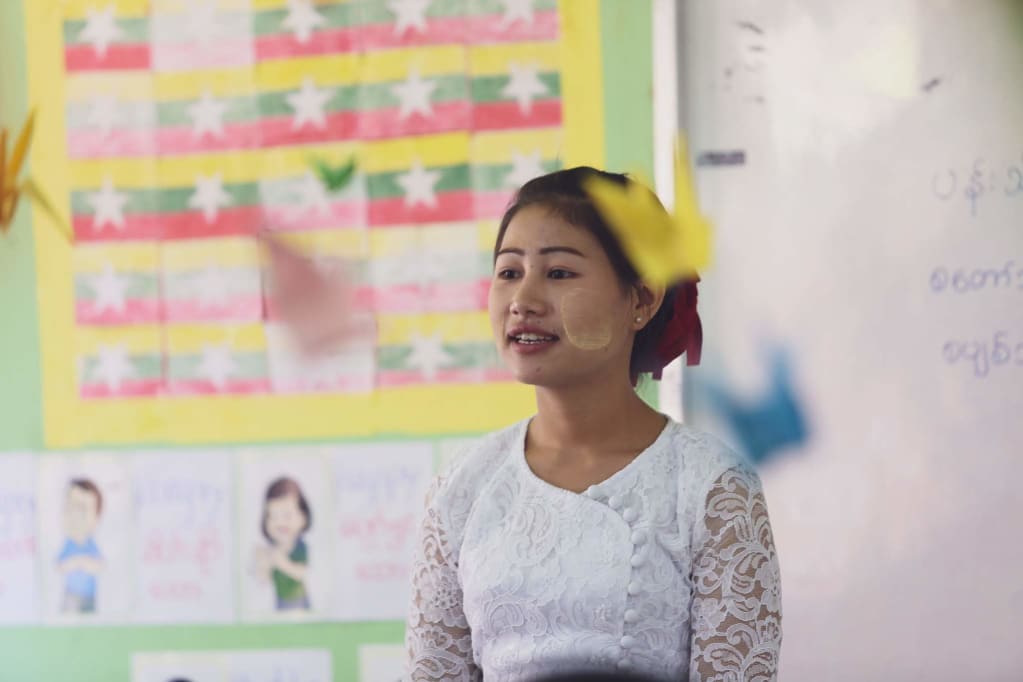

In Nepal, we know fewer than half of households have access to the internet in the communities we serve. We had to innovate fast to ensure that covid-19 would not widen already existing inequity.
We turned to a medium many might consider old-fashioned: radio. Over 85% of households within the communities we work with have a radio. So we began teaching a daily lesson over a handful of local radio stations, with prompts for further homework.
Within weeks, 10,000 children were listening each day and more radio stations wanted to broadcast our work - we now work in collaboration with 10 local FM stations. An innovative idea turned into our major programmatic response to this unprecedented crisis.
In June 2020, we conducted a beneficiary survey to fully understand the impact of this programme.
WHAT WERE THE RESULTS?
In interviews with over 600 households in June, we learnt:
- Most children (about ¾) found the radio programme engaging and understood the content.
- Some younger children were struggling with the daily programme, so we moved to broadcast grade-specific lessons: 8 lessons a day with 30 minutes for each grade.
- Rather than broadcast during daytime to replicate school hours, we should broadcast in the morning and evening around parent's working hours.
Radio lessons are laying the foundations for a successful school reopening. They mitigate learning loss, and sustain a routine of education in communities where the culture of learning is new and fragile.
Radio also complements our other strategies, with takeaway education programmes reaching the minority of children who do not have access to radio. We have a recovery plan in place to prevent drop out when schools reopen. Our Every Child Counts campaign makes our intent clear: our goal is for every child to return to school without exception.
The challenges ahead are grave. Nepal has been badly hit by covid-19. Many families, including some in the communities we serve, depend on income from work overseas that disappeared overnight and might never come back. Starvation is rising, suicide rates have never been higher and heavy monsoon rains are displacing thousands.
We must not let this crisis reduce our investment in education - in fact, it must spur us to redouble our commitment. Covid-19 has taken much; we cannot let it take our children’s futures too. Education must continue, now more than ever.
As of 10th July 2020, thanks to your support we have been able to:
Coronavirus has reached all three countries we operate in, with cases particularly growing across Nepal. It is crucial that we continue to prepare for a widespread outbreak in the regions that we work in and ensure children do not miss out on an education in the meantime.
WATER AND SANITATION
Thanks to the generous donations towards our COVID-19 emergency appeal, we have been able to open handwashing facilities in 80% of the communities we work with. Currently our teams in Nepal and Myanmar are working to complete the remaining upgrades before the monsoon starts.
VIRUS AWARENESS
Our virus awareness campaign has been ongoing since May and we believe we have now reached 150,000 people with key messages. We have now entered Phase II of the campaign, which engages community leaders to support them to develop their preparedness for a COVID-19 outbreak in their community.
In Myanmar and Cambodia, our Education Officers have been training the community leaders in COVID-19 preparedness and passing on information sheet, providing leaders with a response toolkit. We then encourage communities to form a management structure, assigning roles to individuals for the different elements of virus management. In Nepal, support is given over the phone to complement and support government coordination efforts.
Topics covered by the training materials include how to quarantine returning community members; processes for contact tracing; complex topics such as ‘direct contact’ on touched surfaces; and procedures for reporting positive cases to the government and referring into medical treatment.
In Nepal, where outbreaks have been more common, the team have been working with leaders since April. In Cambodia, every community has now been trained also. We are beginning to roll out the programme in Myanmar, where the virus is less prominent.
EDUCATION
We have now developed an education continuation programme in each country to supplement lessons whilst schools are shut. The programme looks different in each country:
Nepal
Our daily radio broadcast has been ongoing since May. Owing to its success, this has been increased from 45 minutes daily to 2 hours daily. UWS Fellows design and record the lessons. When lockdown allows, a take away programme will begin and Community Teachers have already mapped where each UWS student lives to this end.
Myanmar
Teachers are conducting classes in small groups of a maximum of 5 students (in line with government recommendations), plus additional homework. This is now running in 59 out of 66 communities, reaching over 2,000 students.
Cambodia
Community teachers are going house to house (maintaining social distancing) and distributing supplementary work. This is reaching approximately 50% of our students so far.
With schools set to remain closed for several more months, it is vital that we continue these learning programmes and reach every child within our partner communities. Not only will this support their learning during closures, it means they are more likely to return to school when they are able to open.
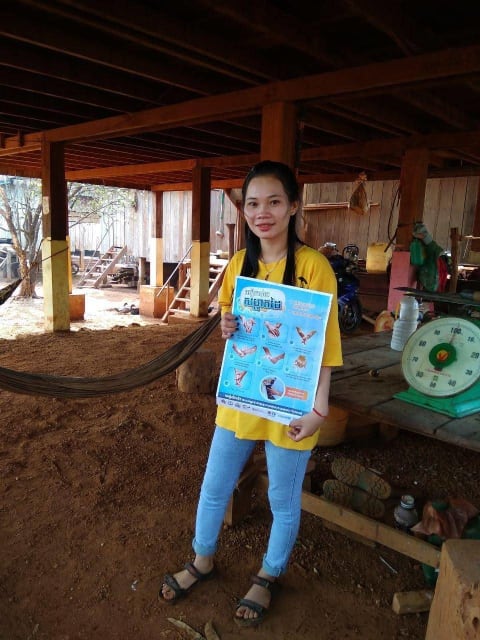
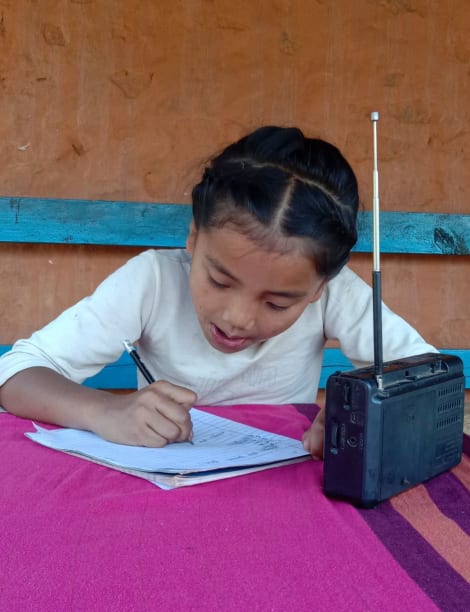
SUSTAINABLE DEVELOPMENT GOAL 4 - QUALITY EDUCATION
Education is the key to improving development in some of the world’s poorest communities. Sustainable Development Goal Four calls for inclusive, equitable and quality education for all. Despite this, in 2018, more than half of children and adolescents worldwide did not meet minimum proficiency standards in reading and mathematics. We're committed to providing inclusive and quality education in these regions.
WHAT COMES WITH QUALITY EDUCATION?
Stemming from our primary aim of providing quality education, 5 other sustainable development goals are addressed
Goal 1: No poverty
In 2013, an estimated 11% of the world’s population lived below the extreme poverty threshold. Reaching remote areas and offering the opportunity for sustainable education helps lift people out of poverty, giving them hope for future possibilities.
Goal 3: Good health and wellbeing
Healthy, sustainable lifestyles are promoted through UWS schools. Many of our schools teach the students about farming through our vegetable gardens, ensuring they have access to balanced and varied diets.
Goal 6: Clean water and sanitation
When built, many of our schools are fitted with a well which provides clean, safe drinking water. We also provide hygiene and sanitation education to support the wellbeing of our students.
Goal 7: Affordable and clean energy
Many of our schools are fitted with solar panels when built to provide renewable, sustainable energy.
Goal 8: Decent work and economic growth
UWS schools provide employment for locals during construction and as teachers. In the long-term, educated children are will have higher incomes and more skilled employment, aiding a country’s overall economic growth.
In addition to these, we also address:
SUSTAINABLE DEVELOPMENT GOAL 5 – GENDER EQUALITY
The fifth Sustainable Development Goal is to achieve gender equality and empower all women and girls. This is an area in which there has been great progress over the past decade, as the risk of a girl marrying in her childhood in Southern Asia has dropped by over 40% between 2000 and 2017. We are striving to continue this trend by giving young girls the opportunity to go to school.
SUSTAINABLE DEVELOPMENT GOAL 10 – GLOBAL AND NATIONAL EQUALITY
Our role in these remote communities also reduce inequality. There are huge rural-urban disparities in all of the countries we work in. Often, the most remote areas are left behind, as governments lack the funding and capacity to provide education to these areas. UWS aims to reduce these disparities by providing the children in these communities with an education.
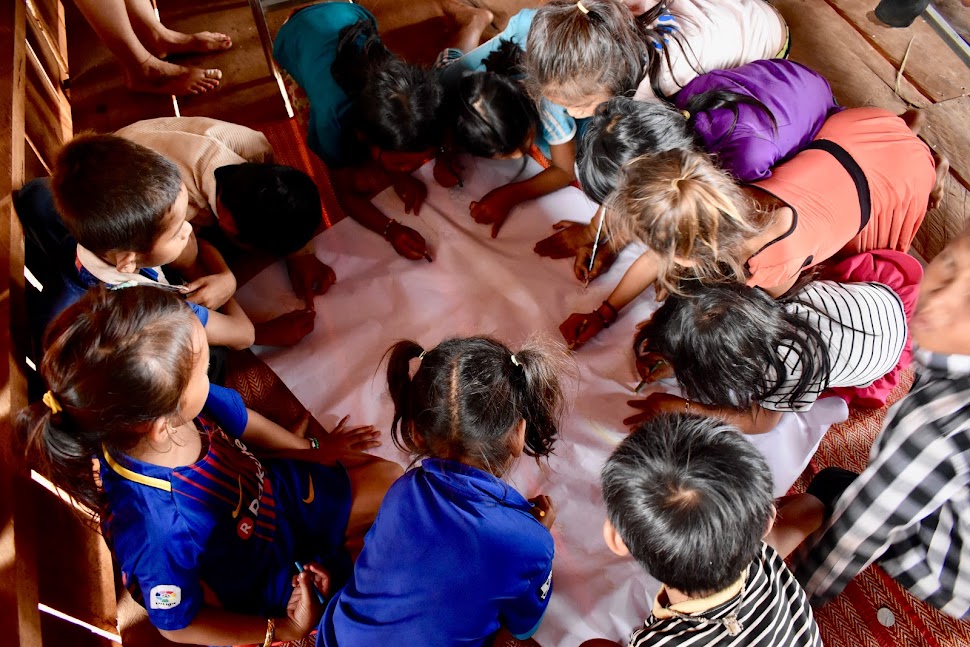
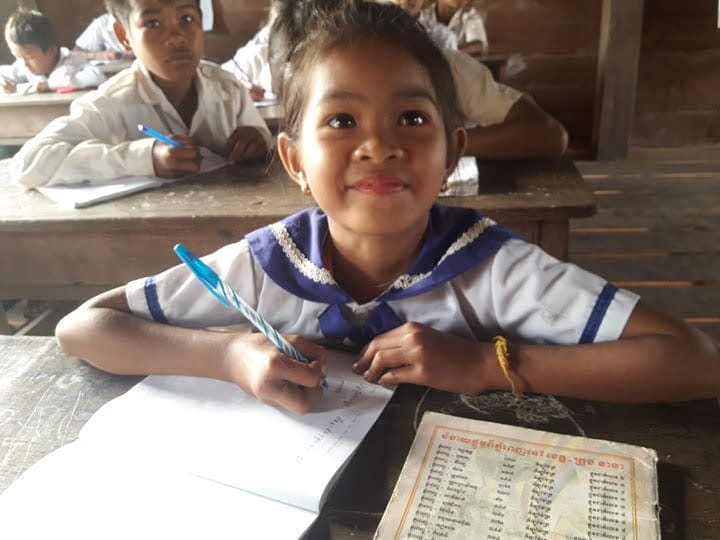
During the three-month break, our Summer School programme takes place across UWS community schools. This is designed to support children who speak indigenous dialects. With over 100 native dialects spoken across Myanmar, many tribal groups across the country are unable to speak the national language, Burmese. For the children of these groups, school can be a challenge as they struggle to follow a curriculum taught in Burmese. This puts these children at particular risk of dropping out of school.
UWS Summer Schools focus on language skills, allowing students to improve their Burmese so they can more easily participate in lessons when the academic year restarts. As well as helping them to access the national curriculum, learning the national language supports children to access opportunities outside of their own communities. With this skill, they will have a pathway to secondary school and improved job prospects.
Our Summer Schools also support older students who are reluctant to learn alongside much younger children, but lack the numeracy and literacy skills to join higher grades. This accelerated learning programme helps them get up to speed in time to join their peers at the start of the new academic year.
This year, we are proud that over 2000 students are attending our Summer Schools in Myanmar. A typical day is two hours long, and activities include group reading sessions as well as learning educational songs and poems.
When the new Myanmar academic year kicks off in June, these students will be able to participate in lessons and continue their educational journey.
Here are just a few reasons why we love these additions to our school sites.
1. LEARNING NEW SKILLS
Vegetable gardens allow students to learn essential farming skills, without taking time out of school. At Helu Besi School, Nepal, the children have been learning how to plant, care for and harvest nutritious, seasonal crops.
2. FOOD FOR THE WHOLE FAMILY
Students can take the crops grown at school home to share with their families. The students of UWS Hang Savart School, Cambodia, love incorporating what they have grown into family dinner (below). Communities also help to build the school gardens, making them a great way to get the whole family involved in school life.
3. A HEALTHY DIET = BETTER LEARNING
A better diet means students are more mentally and physically fit to learn. Students at UWS Wein Wa School, Myanmar, have more energy in lessons thanks to the nutritious vegetables they grow in their school garden.
4. CREATING BEAUTIFUL SCHOOLS
As well as providing environmental education, vegetable gardens improve the school environment. UWS Roy School, Cambodia, has a large vegetable garden next to the playground, making the school a nicer place to learn
From our work in Cambodia, Myanmar and Nepal, we know the devastating impact that pollution can have upon the environment. We have seen first hand how pollution affects the lives people growing up in rural communities, particularly when these villages are dependent on farming, fishing, and hunting to survive. That's why, this World Environment Day, UWS students decided to take matters into their own hands...
READ UWS STUDENTS TOP TIPS TO #BEATPLASTICPOLLUTION
UWS NEPAL CELEBRATES WORLD ENVIRONMENT DAY
On Tuesday 5th of June three UWS Schools in Nepal took a stand against plastic pollution as part of World Environment Day. Witnessing the extent of pollution in their community, students wanted to take action, and took to the streets. In Majhua village, pupils led a protest march against pollution with homemade banners and cardboard signs.
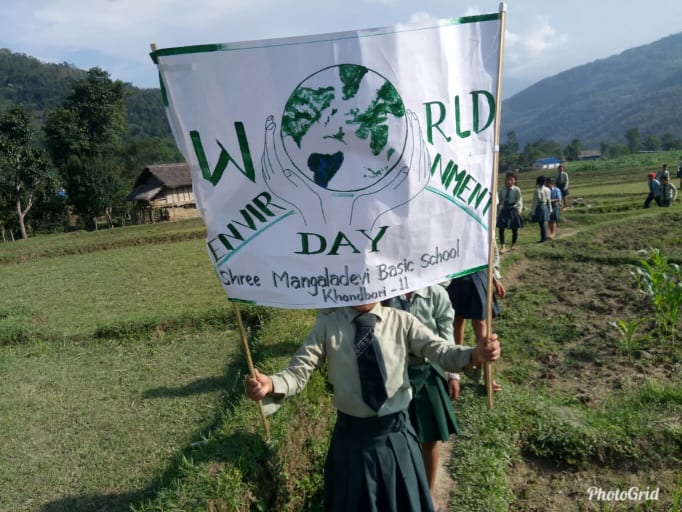
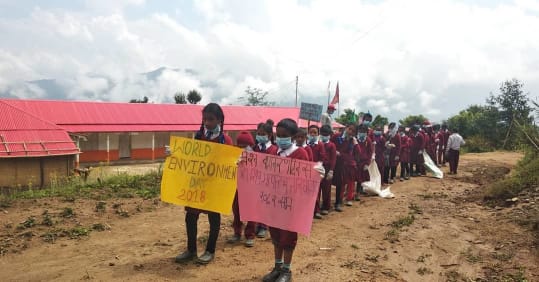
PLANTING THE FUTURE
Deforestation continues to affect life in Nepal, with 1.9% of the country's forest lost on average every year. For people living in rural communities, the impact of this on their life is huge. Healthy land that was supported by surrounding trees and once used for farming is replaced by scrubby bush vegetation. Women and children have to walk further to access good quality firewood that they can use for cooking. Flash flooding is more likely to happen due to the lack of trees.
To highlight these issues, UWS Mude School led a tree planting ceremony to celebrate World Environment Day. Saplings were planted in the school grounds by special guests from Nepal's Community Forest programme and Mude's community leaders.
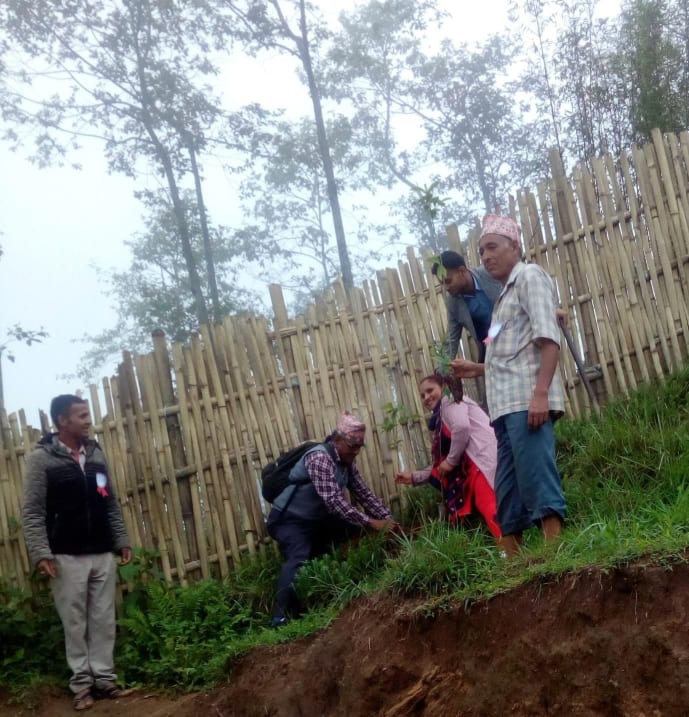
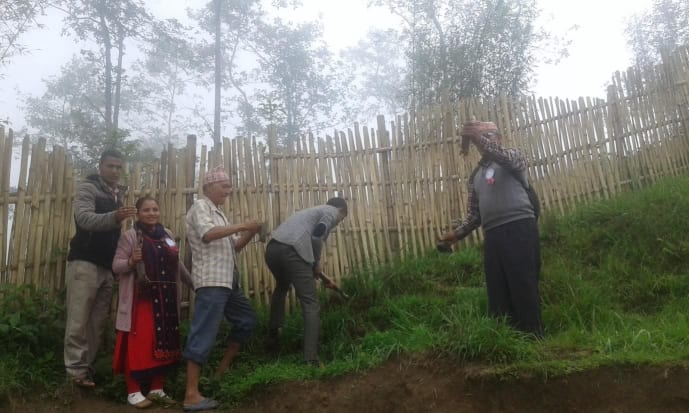
“Heavy rain almost cancelled the event but thanks to the patience of students, teachers, parents and our guests the day was a success!"
Surya Karki
DANCING AWAY THE RAIN:
UWS Mude School’s celebrations for World Environment Day also featured a dance competition, singing, and talks by pupils. Here is a report on the day by our Country Director, Surya Karki:
“Loud claps from the audience encouraged children taking part in the dance competition to keep going and brought a smile to everyone’s face. Our chief guest (Gopal Katuwal, President of Community Forest) spoke on the need to give serious attention towards protection of environment. He appealed to everyone to work towards a cleaner, greener and sustainable world by creating awareness of environmental issues like plastic pollution and deforestation. The event ended with lunch and prizes given to students from Gopal and our president of the School Support Committee. It was a fantastic day full of inspiring words on how we can take care of the environment, however it was the students who were the real inspiration!”
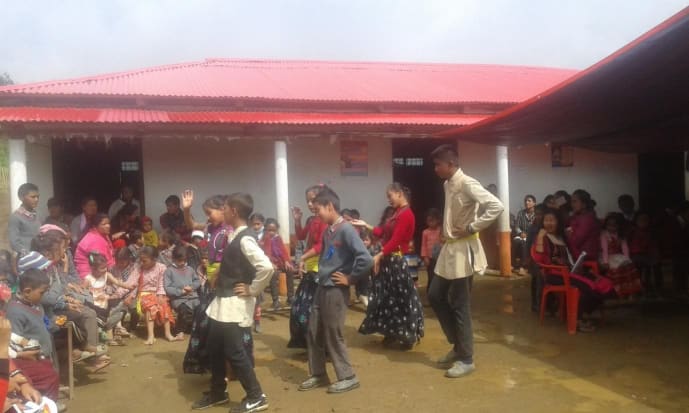
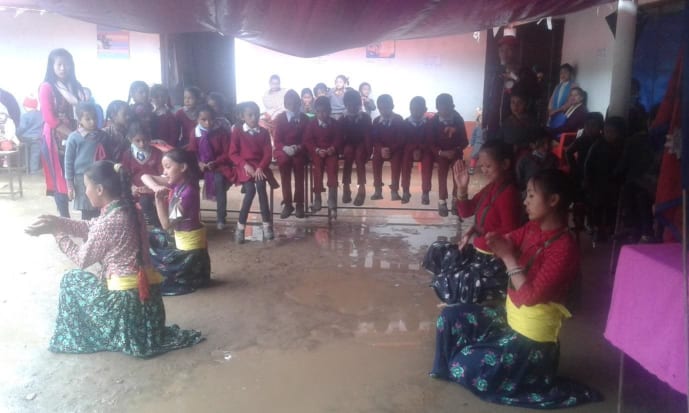
“Investment in the early years requires access to good quality pre-primary education…. It is time to take a good look at the numbers and commit to urgent action. If [donors] don’t, millions of children will fail to reach their full potential."
Professor Pauline Rose, Director of the Real Centre, University of Cambridge
GLOBAL SHORTFALL
Kindergartens are vital for child development. They create effective learners, prepare children for primary school, and have huge impact on their later success in life. However, since 2002,the amount of aid given to pre-school education has drastically fallen. New research by the University of Cambridge shows that 250 million children aged five years or under, are at risk of failing ‘to reach their full potential’ as kindergarten programmes are increasingly underfunded. We know that these programmes are often overlooked within early childhood aid budgets since their impact is ‘less immediate and visible’, but we believe they are crucial for long-term development.
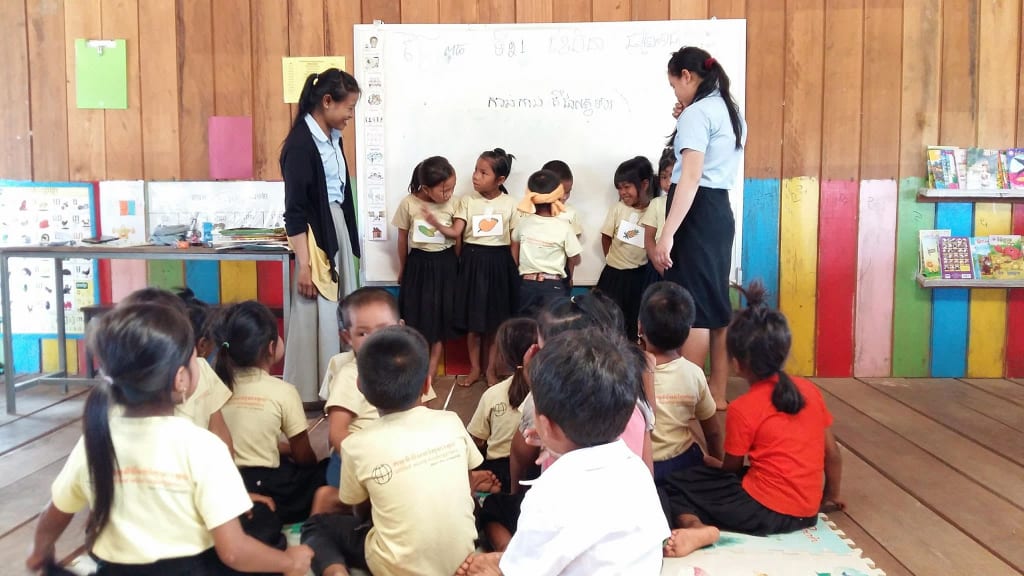
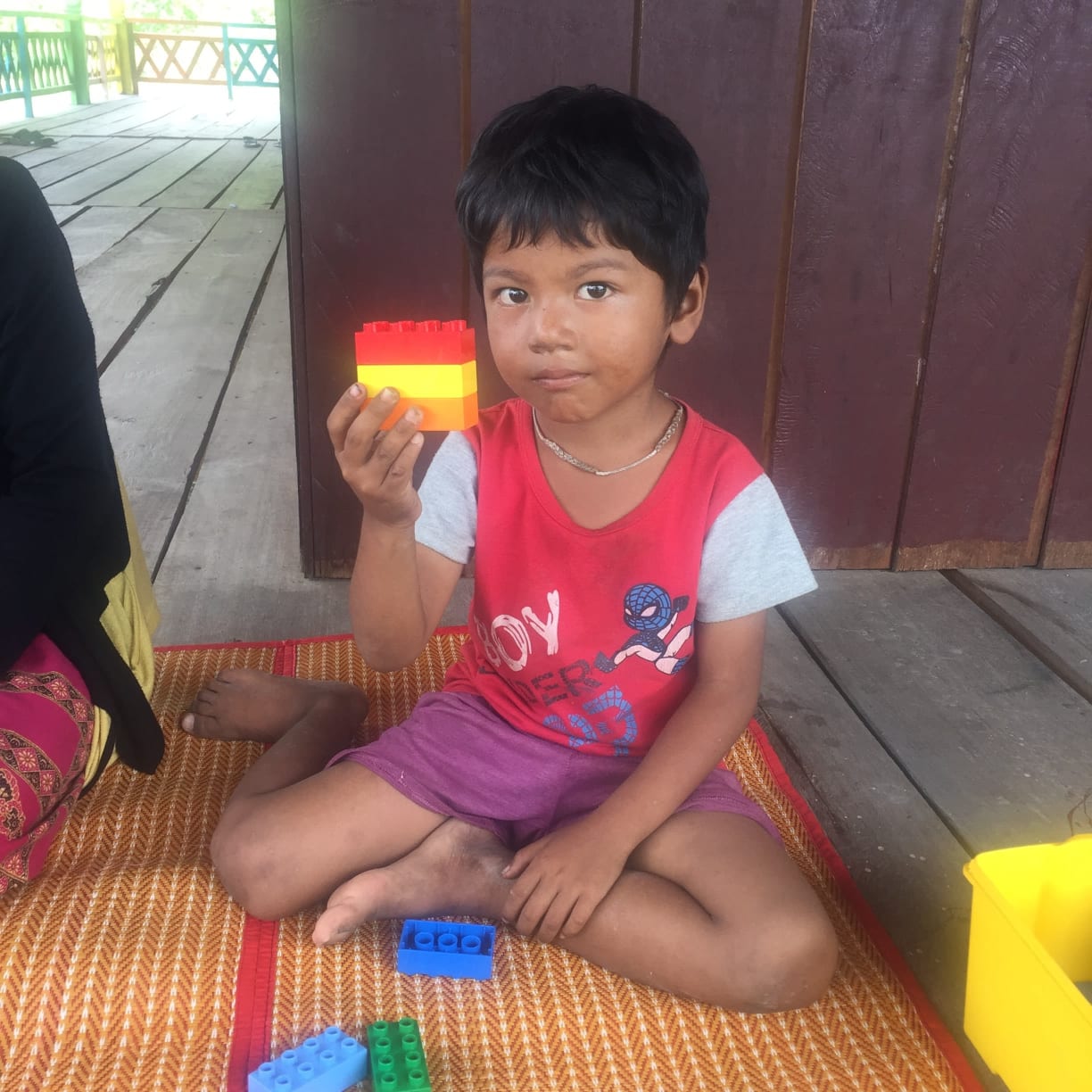
IMPORTANCE OF PRE-SCHOOL EDUCATION
Children who attend some form of pre-school education are more likely to enrol in primary school and remain in education throughout their teens. Studies by Global Education Monitoring Report have even shown that children who have been to a kindergarten performed better in speaking, reading, writing and mathematics by the second grade of primary school than those who did not.
In Cambodia, we often saw older students at our UWS Schools bringing their younger siblings to lessons, sometimes even sitting them on their knee while they tried to work. Our kindergartens provide these communities with a safe and stimulating space for the tiniest members of the family, giving older children the chance to focus on their studies.
UNITED WORLD KINDERGARTENS (UWK)
In 2016, we launched UWK in Cambodia and now have nine operational kindergartens attached to our community schools. So far, over 300 children have been enrolled at a United World Kindergarten, a third of which have now graduated into a primary school.
“All of our Kindergarten teachers are trained to take a holistic approach to education, incorporating resources like lego bricks and duplo into lessons, as well teaching basic numeracy and literacy through games, songs, and art.”
Gemma Barker, UWS Associate Director for Programmes
Each of the kindergartens is built to a standard UWS model. From the brightly coloured walls and fenced wooden platform that surrounds the building, every aspect of the design has been chosen to stimulate independent learning and creativity. Each kindergarten also has a comfortable reading corner, a kitchen to supply the children with a balanced breakfast, and washing facilities to help teach good hygiene routines.
NEXT STEPS
In light of this research, we believe UWK is more important than ever and can go some way towards tackling the global pre-primary education deficit. We have already secured funding for a further kindergartens – taking our total 10 – and are confident we can expand our programme into more schools with your support.


